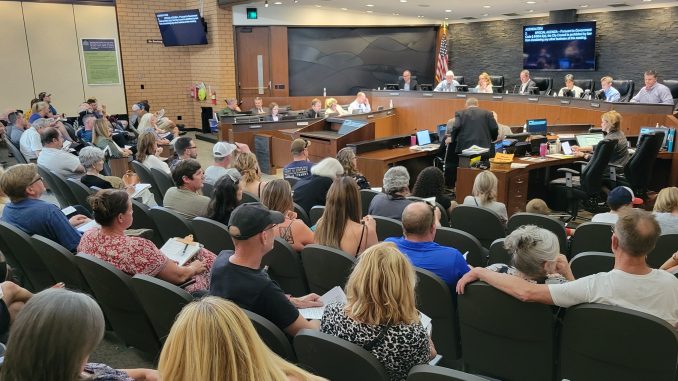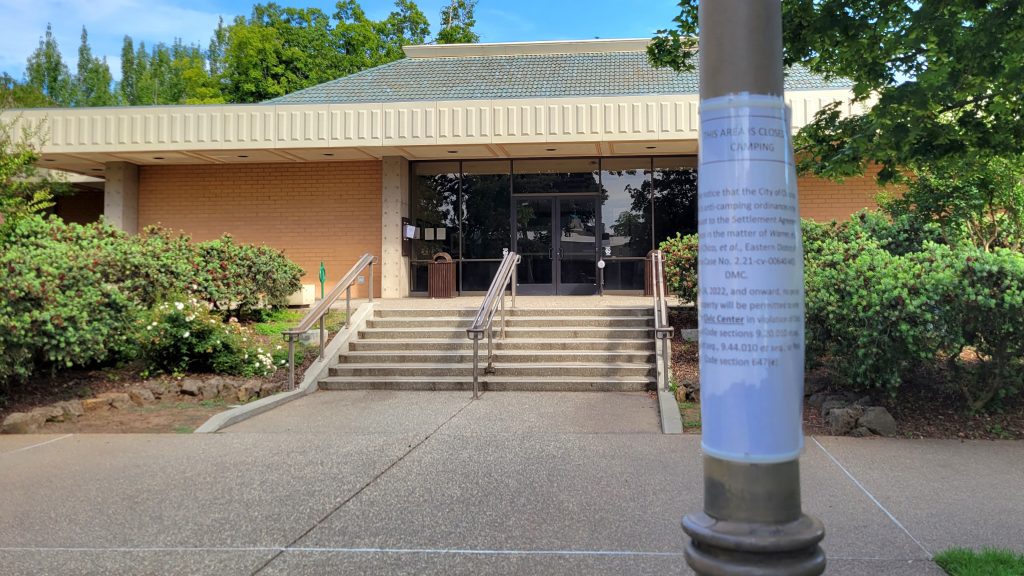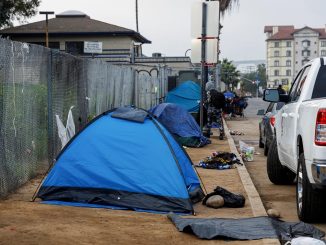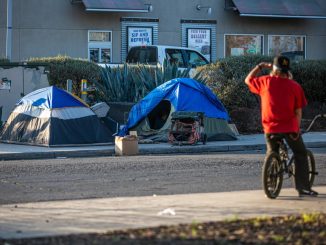
Frequently on an election night, the Chico City Council holds a brisk meeting with the agenda short and simple. That wasn’t the case Tuesday (June 7), as polls closed for California’s primary. The council convened an hour early, at 5 p.m., for a special closed session on labor negotiations, then deliberated more than three hours on several contentious matters: a sales tax measure, the city budget and, most notably, alternative camping sites for unhoused individuals who do not move into shelters.
The latter item drew a capacity crowd, as was the case at the previous meeting, May 17, when the council approved a single site at Cohasset and Eaton roads. Under consideration Tuesday were 10 sites—including the approved location, one across the street and a couple rejected last time—for a list of three.
Thirty-six residents, plus six who submitted comments online, addressed the issue; 30 opposed specific sites, with some threatening litigation. Neighbors of Teichert Ponds were most numerous, but others got just as vocal about the stormwater detention property along Fair Street near Country Drive, as well as Depot Park and sites near Marsh Junior High, Little Chico Creek and the new Eaton roundabout.
“Let’s make a deal,” Chris Mitchell, his voice rising with anger, proposed: Move every homeless camper from Humboldt Road and Windchime Park, near his home, and he’d be OK with four or five designated campers at the Triangle (Pine and Cypress). Not that he felt the council had given residents a choice—“You shoved this down my throat.”
Siobhan Diamond echoed worries of schoolboy Quentin Brannen; both their backyards overlook the Fair Street property across the creek, without fences. She’s lived in the location four decades, she said, the last three years in fear.
Interim City Manager Paul Hahn explained that the alternative camping sites are for people who receive notices to move but do not meet intake criteria at the Torres Shelter or the city’s temporary Pallet shelter. Of the first 100 campers contacted by the city during the initial rounds of outreach and enforcement, he said, five did not qualify for shelter housing. At that rate, based on the capacity of the 177-unit Pallet shelter and the Torres Shelter, Hahn estimated the alternative sites accommodating a maximum of 10 to 15 campers total.
The sites fall under the Warren v. City of Chico lawsuit settlement agreement. The specific provision states that when outreach staff determine there isn’t an “appropriate shelter space for a homeless person,” the city cannot enforce anti-camping regulations against the individual but “may provide … a list of at least three public property locations” where the city will not enforce these ordinances for 60 days “and may require the homeless person to relocate to one of those three sites.”
Councilman Michael O’Brien, previously Chico’s police chief, homed in on the distinction between “may” versus “shall” and asked City Attorney Vince Ewing if the city could have one or two sites instead of three. Ewing called that “discretionary”—the city cannot enforce anti-camping ordinances without a site, but the number and location of sites are council decisions.
“I think we’ve been pretty freaking generous as a council,” Vice Mayor Kasey Reynolds responded. “We’ve spent $5 million [on homeless solutions]. We’ve dedicated one site, in my district. If someone doesn’t want to go there, that’s not our problem unless it gets full.”
Councilman Dale Bennett moved to continue with the Cohasset and Eaton site and make available a half-acre of the city’s 11.5-acre parcel across Eaton if necessary. Councilman Sean Morgan seconded the two-site motion, which passed 5-2, with Reynolds and Councilwoman Alex Brown dissenting.
Reynolds, who cited both sites being in her district as her reason for voting no, later requested the council agendize at a future meeting a discussion of “what can be done to improve quality of life in Chico” within the parameters of the Warren v. Chico settlement. Morgan seconded her motion, which passed unanimously—Brown saying, “Kinda broad, but OK.”
Mayor Andrew Coolidge later told the CN&R by phone that Reynolds had discussed the idea with him previously; her motion was not a spontaneous response to concerns raised by residents Tuesday night. “I’m looking forward to having that conversation,” he said.
As for the decision to select the two sites, Coolidge said three “probably would have been ideal for [Ewing] to tell the judge [overseeing the settlement], but I think two gets us far enough along. We may have to choose another site … now at least we’re in compliance so we can move forward with enforcement.
“I think that was a good revelation to discover in the meeting, and I think a lot of people appreciate that [the number of locations] went down. It certainly made the process easier—and a lot easier for the community to swallow. … The two sites aren’t ideal but are good enough.”
Both on the dais and the next morning, Brown expressed frustration. The outcome was a minimal response, and the discussion that led to it reflected a broader pattern.

“The whole tenure of this council was built around restriction, was built around scapegoating,” Brown, the lone progressive among six conservatives, said by phone. “The policies that this council, and a previous iteration of this council, put in place and then thickened and made more severe after the 2020 election are what got us into this. When you violate human rights—when you tell people they have to move but they have nowhere else to go, that this is something they’re just going to have to deal with—you’re going to have problems. The problem, as found by a judge and the court, is it’s a violation of civil rights, a violation of the Constitution.
“Maybe it was well-meaning in their own way to ramp up enforcement. Maybe they thought it was going to get better. But it doesn’t work that way, and the lack of recognition of that is so absent. And several of my colleagues blamed COVID-19 and the previous council for what’s going on now; that’s the same scapegoating we’ve heard since the very first day.”
Money matters
Brown also dissented from the majority on two fiscal issues, voting against the city budget for 2022-23 and the November ballot measure for a 1 percent sales tax increase. Both passed 6-1 with just over a dozen residents in attendance.
The council green-lit the $211 million budget plan at the previous meeting. Tuesday night’s vote represented the first of two required for authorization. The city’s budget for 2021-22 was $142.9 million.
Brown’s objections included transparency regarding specific line items not explained in staff reports—an increase in police spending of approximately $2 million and the return of the downtown ice rink—but mainly centered on the financial forecast. She said the budget represents “an overall attitude that we’re not headed for an economic crisis or people aren’t struggling. I think that needs to be recognized.”
Coolidge said the budget takes inflation into account—a concern expressed by a public speaker—and “will be fine. I am not predicting economic gloom like some folks. I think we still have a really strong local economy, and I think it will keep moving forward in a really good way.”
That optimism carries over to his support for the sales tax measure, which Coolidge has championed the past 18 months. The council voted in September to put a 1 percent increase to the voters this November; Tuesday night’s vote ordered the measure onto the ballot with an impartial analysis prepared by Ewing. It also prohibited council members from submitting their own ballot arguments on the matter.
Deputy City Manager Jennifer Macarthy presented survey results indicating Chicoans’ priorities for the additional $24 million in annual projected revenue. Safety and homeless services topped the list. The most recent polling dates to 2019, when support ranged between two-thirds and three-quarters of likely voters. According to Macarthy, Chico is one of just eight California cities with over 50,000 population that has a minimum sales tax of 7.25 percent; Paradise is 7.75 percent, Oroville 8.25 percent.
“It needs to be done,” Coolidge said. “It needs to be done so we can keep our town in the condition it needs to be. In terms of people supporting it, I think a vast majority of the citizens of Chico realize that Chico is long overdue. We are falling behind.”
Brown supports an addition to the sales tax—just not now.
“We have only essentially one shot to get it right, to get people on board, to get them to support and vote for the measure,” she said, “and I think during the global pandemic that we’re very much in, with the rising cost of goods and services and housing, it’s a little bit of an affront to the community to try to convince them to give the city more money. I don’t think that the time is right, unfortunately.
“I think it’s a little short-sighted,” Brown added, “and quite frankly, I don’t think that my colleagues are fully behind it either—or at least believe it’s going to pass. More money spent on the dog and pony show, to no avail. I’ll be pleasantly surprised on the city’s behalf if it does pass; I think it’s absolutely necessary. But I can see where this council’s priorities are. There’s some overlap, but there’s some misalignment too, and I’m not putting my vote behind that.”
In the night’s other significant item, the council unanimously supported a five-year renewal of the Downtown Chico Property Business Improvement District, or PBID, in which the city is the largest property owner. The district, which formed in 2017, hires the downtown ambassadors to enhance cleanliness and safety, funded by assessments. A majority of property owners within the PBID must agree to renew it.




Missing in your articles is that people only got ONE MINUTE to speak. I talked to several People the who wanted to raise responsible criteria, but weren’t allowed to. That group included me. Instead I asked how many of the Council lived within 300 feet (a football field distance) of any of the current or proposed camps. Of course they didn’t reply, as usual they don’t want to engage in Civil Discourse with the public.
As for the Tax increase, didn’t Gallagher say in his campaign that he was opposed opposed to governments that use Tax increases, and Mandates, to cover up their failures?
Inflation has already increased what we pay in sales Taxes. Most of use can’t afford to pay more when we face inflation and a possible recession. Wake up . This Council is all about ignoring the FACTS. In L.A., who also have a district systems , they are holding meetings in each district with a district representative . They are to determine what kind of Camping restrictions would best best serve their districts. Imagine that …actually meeting and having discussions with your representative. What a concept!!!
This council has failed us with their “Build it and they will come philosophy”. Utter failure.
Casey Reynolds was not elected to serve as the District 6 representative. She was elected at- large . She claims a mantle she was never given by the voters that District. Once again she is not the elected District 6 representative. Once again she is LYING TO THE PUBLIC. Where is her integrity? I don’t believe she has any. This council is very disturbing.
How much of this tax increase will be used to pay for pensions? I’ll be voting NO.